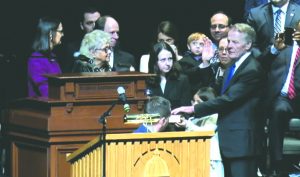Power stays in Speaker Madigan’s hands in Springfield
By Kevin Beese Staff Reporter — January 15, 2019
Illinois Attorney General Lisa Madigan swears in her father, state Rep. Michael Madigan, as speaker of the House at a Jan. 9 ceremony. Michael Madigan is the longest-serving state House speaker in the country. (BlueRoomStream.com)
Despite just being elected a state representative, Anne Stava-Murray already has her eyes set on the U.S. Senate.
That may be a good thing as the state House may not be the friendliest place for the west suburban Democrat.
Stava-Murray, you see, was the lone House Democrat not to give Michael Madigan of Chicago the nod for re-election as speaker. The state representative, making good on a campaign promise, voted “present” when the tally for House speaker was taken between Madigan and House Republican Leader Jim Durkin.
“The lone dissenting voice of dissent shows the overwhelming and unique power that Mike Madigan is able to amass as speaker of the House and chairman of the Illinois Democratic Party,” said Austin Berg, content director for the Illinois Policy Institute, an organization generating public policy solutions aimed at promoting personal freedom and prosperity in Illinois.
A Democratic super-majority in the House put Madigan back in the speaker’s chair as the 101st General Assembly began Jan. 9. During his 34-year reign as the longest-serving state House speaker in U.S. history, Madigan has become the most powerful state legislative leader in the nation.
The current state House rules grant Madigan overwhelming power, allowing him to control who votes in committees, who is assigned committee chair positions that include stipends, and dictate which bills are called for a vote and ultimately become law.
A vote on the rules governing this session of the General Assembly will take place Jan. 29, but is likely to do little to throttle Madigan’s power over the next two years.
Stava-Murray, a Democrat from Naperville, voted “present” when her time came during the roll-call vote on who should lead the chamber for the next two years. It marked the first time a freshman lawmaker — and only the third time overall in 34 years — that a Democratic representative didn’t support Madigan’s ascent to leadership of the body.
She has already announced her intention to run for the U.S. Senate in 2020.
Representing the 81st District, which includes all or part of Bolingbrook, Darien, Downers Grove, Lisle, Naperville, Westmont and Woodridge, Stava-Murray said during the campaign that she would not support Madigan for speaker and followed through on that during the Jan. 9 vote.
“After winning my election, there are a few people in my party who have tried to bully me in a very obvious way for my respectful vote against Speaker Madigan keeping his unprecedented power,” Stava-Murray said in a post on her U.S. Senate campaign website. “I’m the third person in over 30 years to do so. However, many people have also been supportive and friendly behind the scenes.”
The other two House Democrats not to give Madigan their support for speaker were the late former state Rep. Richard Mautino of Spring Valley in 1987 and state Rep. Scott Drury of Highwood in 2017.
After his 1987 vote, Mautino was deprived of a vice chairmanship on a House committee. Two years later, he voted for Madigan as speaker and was made chairman of the House Insurance Committee.
Drury lost his vice chairmanship position on a House committee after his 2017 vote. By that point, Drury likely knew he was not returning, already having an eye on running for governor or attorney general in 2018. (He chose attorney general).

House Speaker Michael Madigan talks to lawmakers and audience members at the start of the 101st General Assembly. (BlueRoomStream.com)
Whether Stava-Murray sees her legislation bottled up in committee or gets a fair shake in the Democratic-controlled House remains to be seen. With more of a spotlight on Madigan these days, he may not want to give the appearance of treating her badly. Madigan is always looking at the next looming election so keeping the 81st District seat in Democratic hands may give Stava-Murray some leeway.
Illinois Policy’s Berg said it is too early to say what impact Stava-Murray’s speaker vote may have on her legislative abilities.
“It’s tough to say. There is a lot of attention on the speaker now, which is kind of a new phenomenon,” Berg said.
Stava-Murray said the backing she has gotten so far both inside and outside her district for her stance against Madigan has been reassuring.
“To the state Democrats willing to work with me and the thousands of everyday people across the state who have commented, sent letters, emails and (Facebook) messages in support, I say ‘thank you,’ the Naperville Democrat said. “You make traveling to a workplace with an ongoing problem of sexual harassment/assault for two years something I’m willing to follow through on.”
While the vote for speaker puts Madigan back in charge, the rules vote coming Jan. 29 is where he will get his true power, Berg said.
“That is the vote that makes him the most powerful speaker in the country,” Berg said. “It gives him so much procedural power.”
Get your free subscription of the Cook County digital edition
Unless a drastic shift happens between now and the rules vote, Madigan will have the power to assign all the committee chair positions — each nets a $10,000 stipend — who votes in committees, dictates the legislative calendar and, most importantly, appoints the Rules Committee chairman, who determines what bills are called to the House floor.
“It is unique that a speaker is granted that much power,” Berg said. “It is the most super-majority Democratic the House has been in a long time and it is the most undemocratic House in the nation because of the rules.”
Madigan said he is excited a new governor will be leading the state.
“It has been four long years of character assassination, four long years of personal vilification, four long years of strident negotiating positions, also known as my way or the highway,” Madigan said after being elected House speaker in a 72-44 vote. “For the last four years, people working with people has not happened rather we have gotten a series of ultimatums.”
The speaker for more than three decades said there is a budget imbalance and too high of a debt hanging over the state’s finances.
He said people have talked with him about closing the book on the Bruce Rauner administration and starting fresh with the J.B. Pritzker administration.
“Let’s not talk of just closing the book. Let’s talk of closing one chapter of the book,” Madigan said. “Let’s take the lessons from that chapter so we can move on to a new chapter where people work with people.”
State Rep. Emanuel “Chris” Welch (D-Westchester) put Madigan’s name into nomination for speaker.
“Watching Mike Madigan work these past four years has been a real case study in true leadership,” Welch said. “Illinois suffered greatly the last four years. What we saw was an epic struggle, a struggle that caused our state to go 736 days without a budget.
“We were talked about all across the country, a cloud hovered above all of us. With Mike Madigan leading the way, we didn’t waver. We stood strong; and we protected the heart and soul of this great state.”
Welch said one of the reasons for Madigan’s success is that he listens to people.
“During our darkest days there were several key moments in time when Mike Madigan listened to the rank-and-file members, both Democrats and Republicans,” Welch said.
State Rep. Jim Durkin (R-Burr Ridge) gave his third acceptance speech after his being named Republican House leader. He said he was ready to work with his Democratic colleagues to move the state forward.
“The task ahead may take time and seem daunting,” Durkin said. “Illinois’ problems are many and the easy answers are few.”
Durkin also said he was hopeful that lawmakers would focus on helping people and not getting reelected.
“I am optimistic that for once in many, many years, we can put politics aside and now work toward the greater good of our constituents and their future,” he said.
Durkin said he and fellow Republicans would work for many things, including a more progressive tax system and more fair legislative maps. With maps to be redrawn this General Assembly, Durkin’s call for “nonpartisan fair maps” brought a standing ovation from his Republican peers. Pritzker has vowed to not sign off on maps that are drawn for political purposes.
Durkin also gave his Democratic peers some advice.
“I’ve never let the ‘R’ or ‘D’ next to a representative’s name impact the way I thought about that representative’s district or constituents and I hope you do the same,” Durkin said. “All our constituents deserve better than we have given them in recent memory. They are losing faith in Illinois, in government and our future here.”
kbeese@chronicleillinois.com








